Brian Clegg's Blog, page 42
May 16, 2017
Upgrade your OS!
 You can't escape the WannaCry ransomeware attack in the news. And it's a good thing that there has been plenty of coverage. But I do wish the news concentrated a bit more on how you can keep yourself safe and less on trying to find someone (other than the hackers) to blame. There are three things that everyone should do, any of which would have prevented data loss, and two of which would have prevented the attack succeeding in the first place.Do regular backups. I know it's boring, but do it. In the very early days of PCs, I had two hard discs fail within six months, in each case losing everything on them. The first time I was unprepared and lost months of work. The second time I was backing up every day and lost nothing. These days it's really easy - with something like OneDrive, Google Drive or Dropbox you simply keep your work in a specific folder on your computer and it is all automatically backed up. As it happens, in the case of the ransomware attack, you might find that the encrypted data started to replace the backups - so rapid disconnection from the internet and an occasional local backup as well would have been an additional good precaution.Don't click on links in emails. This attack was initiated by a fishing email where a user had to click on a link that didn't go where it said it did. In practice, you hardly ever have to click on a link in an email - for example, if you get an email from your bank, or Amazon, or Paypal or whatever, log in normally and check for an alert within the site. Most email software will tell you the address a link goes to if you hover the mouse pointer over it, either as a floating box or at the bottom of the screen. You can use this to check if a link is legitimate, though be careful as some malicious emailers use addresses that sound like the real thing. But most don't.Always install operating system updates as soon as you get them. Although it hasn't been hugely covered, this was the biggest problem in the case of the ransomware attack. Microsoft had issued an update in March that would have prevented it from happening. The number of times when I see other people's computers and they have an operating system update outstanding is remarkable. OS updates almost always include security patches. If you don't install them as soon as possible, you've only yourself to blame.Although not about direct prevention, there are a couple of other minor things. Some were probably hit because they were running versions of Windows like XP that are so old that Microsoft no longer updates them. I know this can be tempting, especially when the alternative is the awful versions of Windows that have been issued lately. But there comes a point when you have to move on. One of the reasons some don't is because Microsoft has typically charged quite a lot for new versions of operating systems. This, arguably, is another reason for switching to Apple (which doesn't). Not to mention the lower levels of attack on Macs. (If you have a Mac, though, don't fall into the trap of thinking you don't need anti-virus - you do. I'd recommend the free Sophos product.)
You can't escape the WannaCry ransomeware attack in the news. And it's a good thing that there has been plenty of coverage. But I do wish the news concentrated a bit more on how you can keep yourself safe and less on trying to find someone (other than the hackers) to blame. There are three things that everyone should do, any of which would have prevented data loss, and two of which would have prevented the attack succeeding in the first place.Do regular backups. I know it's boring, but do it. In the very early days of PCs, I had two hard discs fail within six months, in each case losing everything on them. The first time I was unprepared and lost months of work. The second time I was backing up every day and lost nothing. These days it's really easy - with something like OneDrive, Google Drive or Dropbox you simply keep your work in a specific folder on your computer and it is all automatically backed up. As it happens, in the case of the ransomware attack, you might find that the encrypted data started to replace the backups - so rapid disconnection from the internet and an occasional local backup as well would have been an additional good precaution.Don't click on links in emails. This attack was initiated by a fishing email where a user had to click on a link that didn't go where it said it did. In practice, you hardly ever have to click on a link in an email - for example, if you get an email from your bank, or Amazon, or Paypal or whatever, log in normally and check for an alert within the site. Most email software will tell you the address a link goes to if you hover the mouse pointer over it, either as a floating box or at the bottom of the screen. You can use this to check if a link is legitimate, though be careful as some malicious emailers use addresses that sound like the real thing. But most don't.Always install operating system updates as soon as you get them. Although it hasn't been hugely covered, this was the biggest problem in the case of the ransomware attack. Microsoft had issued an update in March that would have prevented it from happening. The number of times when I see other people's computers and they have an operating system update outstanding is remarkable. OS updates almost always include security patches. If you don't install them as soon as possible, you've only yourself to blame.Although not about direct prevention, there are a couple of other minor things. Some were probably hit because they were running versions of Windows like XP that are so old that Microsoft no longer updates them. I know this can be tempting, especially when the alternative is the awful versions of Windows that have been issued lately. But there comes a point when you have to move on. One of the reasons some don't is because Microsoft has typically charged quite a lot for new versions of operating systems. This, arguably, is another reason for switching to Apple (which doesn't). Not to mention the lower levels of attack on Macs. (If you have a Mac, though, don't fall into the trap of thinking you don't need anti-virus - you do. I'd recommend the free Sophos product.)Don't let the news of the ransomware be just a pleasant distraction from the election, or a frustration if you are worried about an NHS appointment. Make sure you keep yourself protected too.
Published on May 16, 2017 01:01
May 15, 2017
Danny Dyer is not so special
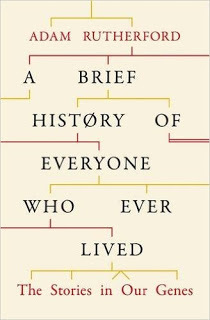 To be honest, I don't really know who Danny Dyer is, but I was forced against my will to watch some of the BAFTA TV awards last night, and one of the clips featured him being gobsmacked that he was descended from royalty, as if this somehow makes him special. It really doesn't.
To be honest, I don't really know who Danny Dyer is, but I was forced against my will to watch some of the BAFTA TV awards last night, and one of the clips featured him being gobsmacked that he was descended from royalty, as if this somehow makes him special. It really doesn't.Let's be clear, this isn't about my anti-monarchist leanings. What I mean is that I can guarantee that you are descended from royalty too.
There's a fascinating bit in Adam Rutherford's book A Brief History of Everyone who ever Lived that shows that if you have European blood, the chances of you not being descended from the Emperor Charlemagne are negligible. (Don't worry if you aren't at all European - you'll have a royal lineage too.) In fact you are a descendent of everyone alive in Europe in the 10th century who has living relatives now. So, if you prefer your royalty British, provided they have living relatives, you are a descendent of Alfred the Great, Rhodri the Great, almost certainly Macbeth (he's just a little late, but I had to go with him) and Brian Boru.
So, please don't bother to get excited about being descended from royalty, Danny. We all are.
Published on May 15, 2017 01:42
May 13, 2017
The difficulty of setting a novel in a different country
 I've just finished Elizabeth George's latest Inspector Lynley novel, A Banquet of Consequences. As always, I enjoyed it (though I really wish she could keep the length down - this one weighed in at over 650 pages). But, as always, a rather evil part of the entertainment was spotting where this American writer fails to get her English setting right.
I've just finished Elizabeth George's latest Inspector Lynley novel, A Banquet of Consequences. As always, I enjoyed it (though I really wish she could keep the length down - this one weighed in at over 650 pages). But, as always, a rather evil part of the entertainment was spotting where this American writer fails to get her English setting right.I, certainly, would never be brave enough to try this. I've had enough experience with US versions of popular science books ('What is a skirting board?' 'A coconut shy?') to realise it's almost impossible to get everything right. I'm certainly not objecting to George doing it, but as a consequence, I do think she's fair game for spotting where things just don't quite work. According to the acknowledgements, she always employs locals to ensure she gets things right, but if this is the case they are being overly nice to her, because a handful of errors always slip through - and there were several cases in this one.
I'm not going to pick out them all - there comes a point where overloading with examples becomes breaking a butterfly on the wheel - but there are two that illustrate perfectly the dangers of this approach. One is in speech idioms. One of George's recurring main characters is a circa thirty-year-old female police sergeant. She always uses very strange euphemisms when questioning suspects (I just can't see a police officer asking a subject about their sex life by asking them if they've been indulging in 'dip the banger'), but the thing that really is hilarious is the way she frequently refers to women as 'birds', as if she was in some kind of The Sweeney time warp.
The other example is more subtle and involves a practical day-to-day difference between the US and the UK. Someone is buying an item in a shop and signs the credit card receipt. I can't remember when I last saw this happen - signing for a credit card payment went out with chip and PIN a good 20 years ago. But because US banking has always been bizarrely slow to move to new technology - how long were US customers having to print of cheques for monthly bills while we had direct debits? - it's no surprise that a US author doesn't spot how incongruous this is.
I really don't understand how her British checkers miss these things. But it illustrates well the difficulties of setting a novel in a different country.
Published on May 13, 2017 02:47
May 5, 2017
Back to the fold
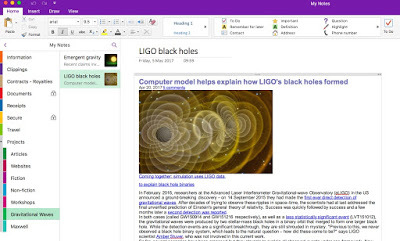 The Mac version of OneNote in actionFor a good number of years I used Microsoft's OneNote for all my note taking. It is wonderfully freeform - a bit like having a scrapbook for anything and everything you can clip or write or type. But as I observed a whole 6 years ago, Microsoft were slow to get things going on (Apple) mobile phones and tablets - and when they did, it just didn't work with the sophisticated facilities of the desktop version.
The Mac version of OneNote in actionFor a good number of years I used Microsoft's OneNote for all my note taking. It is wonderfully freeform - a bit like having a scrapbook for anything and everything you can clip or write or type. But as I observed a whole 6 years ago, Microsoft were slow to get things going on (Apple) mobile phones and tablets - and when they did, it just didn't work with the sophisticated facilities of the desktop version.I've recently been alerted to the latest version of OneNote and I'm pleased to say that the mobile versions are now good enough that I've moved back from Evernote. Although Evernote is great, it lacks the on-page flexibility and structuring of OneNote - it's like coming home.
It has taken a little while to move back, but Microsoft do provide a migration tool to get your notes in from Evernote. They then take an age to synchronise on all platforms (at least if you have 800+ notes like me), but now we're there and it's great. What's more it's free - where Evernote now charges if you use more than 2 devices, or do significant monthly uploading or want facilities like business card recognition.
There are still things Evernote has the edge on - for example its synchronisation seems much faster than OneNote's. But for those who make complex notes, annotate by hand, put together all kinds of resources in planning a book... OneNote can't be beat.
Published on May 05, 2017 04:30
May 2, 2017
Getting in a twist about time travel
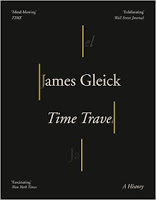 I've read a couple of things lately about time travel that just don't make any sense to me. Specifically, both said that it wasn't possible to travel into the future. One was
Time Travel
by James Gleick, which commented that what special relativity offers is 'just time dilation' not real travel at all, the other being Richard Muller's The Physics of Time, which I am yet to read, but according to this article suggests that you can't travel into the future as it doesn't exist 'yet.' Both of these appear to entirely miss the point.
I've read a couple of things lately about time travel that just don't make any sense to me. Specifically, both said that it wasn't possible to travel into the future. One was
Time Travel
by James Gleick, which commented that what special relativity offers is 'just time dilation' not real travel at all, the other being Richard Muller's The Physics of Time, which I am yet to read, but according to this article suggests that you can't travel into the future as it doesn't exist 'yet.' Both of these appear to entirely miss the point.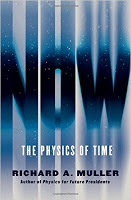 Unlike the TARDIS in Dr Who, real time machines find travel forward in time much easier than backwards, which may be theoretically possible but is practically implausible. And the approach taken to reach the future is totally different from a time machine that disappears from 'now' and reappears at another time - but it is ridiculous sophistry to suggest that a time machine based on the special theory of relativity doesn't allow us to travel into the future. There is well established science, demonstrated in many experiments: it's possible to travel as far as you like into the future - you just have to set off in a spaceship and come back to Earth. When you arrive, you will have moved into the future. The faster you go, the further you will travel into the future.
Unlike the TARDIS in Dr Who, real time machines find travel forward in time much easier than backwards, which may be theoretically possible but is practically implausible. And the approach taken to reach the future is totally different from a time machine that disappears from 'now' and reappears at another time - but it is ridiculous sophistry to suggest that a time machine based on the special theory of relativity doesn't allow us to travel into the future. There is well established science, demonstrated in many experiments: it's possible to travel as far as you like into the future - you just have to set off in a spaceship and come back to Earth. When you arrive, you will have moved into the future. The faster you go, the further you will travel into the future.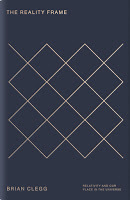 If you move fast enough, you could end up hundreds of years into the future. Everyone you knew - including a twin if you have one - will be dead. The date will be the future date you reach. Of course, it's not an instantaneous leap into the future - but who says time travel has to be instantaneous? No other form of travel is.
If you move fast enough, you could end up hundreds of years into the future. Everyone you knew - including a twin if you have one - will be dead. The date will be the future date you reach. Of course, it's not an instantaneous leap into the future - but who says time travel has to be instantaneous? No other form of travel is.The fun thing about all this is that the mathematics to work out just how far you travel into the future requires nothing more than GCSE maths - in fact, in my new book The Reality Frame I even show how to calculate it (though I admit I put it in an appendix for those who are averse to a few equations). There is no doubt about this - this is real time travel into the future, and those who say it's impossible make science seem far less interesting than it really is.
Published on May 02, 2017 01:49
April 28, 2017
The truth trap
 This article first appeared in the 17 April edition of The Big Issue under the title The Whole Truth.
This article first appeared in the 17 April edition of The Big Issue under the title The Whole Truth.We live in a world of alternative facts. Paradoxically, these arise because political and religious leaders, driven by belief systems, base their actions on what they believe to be 'truths'. By contrast, science, shockingly to some, is not concerned with absolute truth.
Scientists establish the best current theory, given the available evidence. These results are subject to revision as new evidence comes to light. Science is always provisional. This is why scientists often struggle when pulled into political debates. A good scientist avoids the absolute certainties politicians want to hear, and this is interpreted as weakness. The reason scientists do this is that are aware of their frames of reference.
A ‘frame of reference’ is a physics concept - it's at the heart, for example, of relativity, and is about establishing the position from which we look at the world. This is essential, because varying viewpoints give radically different outlooks. Science is unique in offering a clear, analytical frame of reference, based on evidence, rather than belief or opinion. And unlike the politician or religious leader, scientists will change direction when good new evidence contradicts long-held theories. It's ironic that Margaret Thatcher, one of the few senior politicians with a scientific background, was so dismissive of U-turns - because science demands U-turns when the evidence supports them.
This doesn’t make science perfect. Scientists are human beings. Individual scientists can stick with their pet theories in the face of strong contradictory evidence. But science has unparalleled self-correcting mechanisms which, over time, bring theory into line with data.
Science, itself, is sometimes called a belief system. And we certainly have to take many things that scientists tell us on trust. None of us can duplicate the experiments of the Large Hadron Collider, or assess the detailed evidence for climate change. However, by trusting in science, we have the confidence that what we hear is not driven by words of authority written in a book, nor by political theories pulled out of thin air. It is based on our best understanding of the world, with theories that are tested repeatedly against evidence. Most importantly, science delivers. It is because of science that we can cure many diseases, use technology that enables to interact with others around the world or get on a plane and fly through the sky.
By contrast, the beliefs of politics and religion are rarely evidence-based. This might seem unfair. A belief might be based on testimony. Equally, a political theory can derive from the life experiences of a politician. Unfortunately, though, the evidence here reflects single experiences in a messy everyday life. What makes scientific evidence far better quality is that it is based on carefully controlled experiments which are reproducible, producing the same results when someone else repeats the experiment. Until this is the case, the evidence is insufficient to change the best current theory.
This is where the media often misrepresent science. We are constantly bombarded with press articles telling us about scientific research. One day we are told, for instance, that red wine is good for our health... the next that it causes cancer. Leaving aside the reality that both apparently contradictory results can be true - it's entirely possible for a complex mix of chemicals like wine to contain substances that are good and bad for us – the media reports truncate the scientific method. They are presenting the result of a study as if it were a theory. But to be worthwhile, a theory requires far more evidence than a single piece of research.
If more of us engaged with science and its methods, we would have a better chance of holding those who peddle alternative facts to account. Sadly, secondary schools put many off science. When I talk to junior school children, they all love science. But by 13-14 many have been turned off. Secondary curriculums are designed more to give students the Victorian basics than insights into the nature of modern science. Yet without the right frame of reference it’s difficult to understand the science-based decisions our politicians make. We don't all have to become scientists - it would be a boring world if we did. But all of us can enjoy reading about science, and finding out more from videos and talks. With a better frame of reference, we can appreciate the realities of science and its importance to humanity.
Read more on frames of reference in Brian's latest book The Reality Frame .
Published on April 28, 2017 01:47
April 24, 2017
Come back C. P. Snow
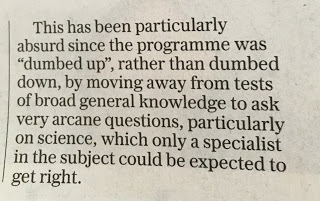 I rarely see the Daily Telegraph, but at the weekend I was at the house of someone who takes it. I couldn't help become a little incensed at an opinion piece by someone called Christopher Booker, bemoaning the 'dumbing up' of University Challenge. Given the proximity to the world marches for science, I couldn't help comment on the piece.
I rarely see the Daily Telegraph, but at the weekend I was at the house of someone who takes it. I couldn't help become a little incensed at an opinion piece by someone called Christopher Booker, bemoaning the 'dumbing up' of University Challenge. Given the proximity to the world marches for science, I couldn't help comment on the piece.Famously, C. P. Snow once made a big thing of the 'two cultures' of the arts and sciences, pointing out that people from the arts side expected a well-educated person to have a good knowledge of the arts, but themselves expressed a kind of smug satisfaction in their ignorance of the sciences.
I could be wrong, but it's difficult not to read Booker's use of 'particularly' as essentially saying 'I expect everyone to have a good knowledge of the arts, but having a good knowledge of the sciences is for specialist weirdos.' The reality is that the science questions are no more specialist than the arts ones - but they might appear to be if you have the kind of prejudice that Snow identified.
In the last decade or two it has occasionally been put about that Snow's assessment no longer applies, but it seems it's alive and well, at least in the pages of the Telegraph.
Published on April 24, 2017 01:40
April 21, 2017
How far can you see with the naked eye?
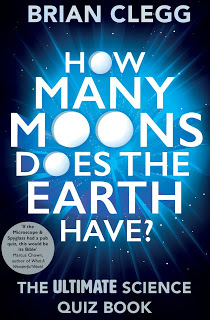 My quiz books
How Many Moons Does the Earth Have?
and
What Colour is the Sun?
are all about asking science questions with interesting or intriguing answers, so I was delighted when a reader, Simon Bartlett, asked about how realistic one of my answers was.
My quiz books
How Many Moons Does the Earth Have?
and
What Colour is the Sun?
are all about asking science questions with interesting or intriguing answers, so I was delighted when a reader, Simon Bartlett, asked about how realistic one of my answers was.The question here (from How Many Moons) was 'What is the furthest you can see with the naked eye?' The traditional answer to this is to point out that you can see at least 21 miles (33 kilometres) across the English channel, and it's said that you can see a candle on a truly dark night about 10 miles (16 kilometres) away. However, I wanted to challenge this by pointing out that you can see the Andromeda galaxy with the naked eye (assuming a dark night and good eyesight), and that's around 2.5 million light years. So, bearing in mind this is usually the standard marker for maximum distance naked eye astronomy, I plumped for that. However, Simon felt this should be considered a bit further:
In answering the question 'What is the furthest you can see with the naked eye?', [don't] you answer address a different question, namely 'How far away is the furthest object I can see with my naked eye?' An object brighter in the visible spectrum but further away could still be visible, so I would suggest that the furthest the naked eye can see is limited by two things, neither of which I actually know - how bright is the brightest object visible in wavelengths we can see, and how far away would it have to be to be red-shifted in order to make it no longer visible?In reality neither of these questions I am supposed to have addressed is ideal. The figure I give for the Andromeda galaxy is a good default maximum as it’s the most distant object you can see with the naked eye under normal conditions - and that, in effect, delivers the furthest you can see. However, in extraordinary circumstances - when a big enough supernova is at its brightest, for example - you could see further still. Even then, though, there is going to be a limit to the range, as the power drops off with the square of the distance away, so you would need an exponential increase in brightness for an object to still be visible. The brightest known supernova to date, ASASSN–15lh (now possibly not a supernova at all) is described as having about 20 times the output of the Milky Way - which for our purposes will do as an order of magnitude comparison with the brightness of the Andromeda galaxy. This means you could push back the distance by a factor of around 4.5 and still see an object of this brightness with the naked eye - so we’re talking about maybe 11 million light years. There are brighter things than supernovas, notably quasars, but a lot of their output does not reach us in the visible spectrum - and they are also immensely distant, so they aren’t going to be seen with the naked eye. The brightest detected quasar, 3C273 is surprisingly bright given it's about 2 billion light years away, but would apparently need an 8 inch telescope to see it - not exactly naked eye stuff.
So my answer certainly wasn't wrong - it still makes sense as one answer to a 'most distant naked eye sighting' - but there's more to be got from that question.
Published on April 21, 2017 01:01
April 10, 2017
Gender neutral titles miss the point
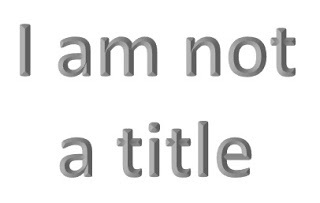 According to news reports, the bank HSBC will allow customers to choose from a whole range of gender neutral titles such as Mx, Ind, M, Mre, and Misc. Some may moan about political correctness gone mad - I would argue it doesn't go any where near far enough. Why do we need to give organisations our 'title' at all?
According to news reports, the bank HSBC will allow customers to choose from a whole range of gender neutral titles such as Mx, Ind, M, Mre, and Misc. Some may moan about political correctness gone mad - I would argue it doesn't go any where near far enough. Why do we need to give organisations our 'title' at all?As far as I can see the only point of using a title is to establish your place in a feudal society - they really should have no place today. Whenever I fill in an online form I leave the title box untouched - yet all too often, the organisation makes it a non-optional selection. I don't want them to label me. It really irritates me, for example, when the programme for an event calls me Mr Brian Clegg. I'm not Mr Brian Clegg. I am Brian Clegg. And why someone who is, say, having a one-off online relationship with me should need a title is baffling.
Some of you may be thinking, 'Ah, but if you don't give a title, they can't write to you formally.' But why do we need a title for that? If you want to write to me informally, put 'Dear Brian' (or in an email etc. just put Hi or Hello - that will do just fine). If you want to be formal put 'Dear Brian Clegg'. That's my formal name.
Not only does dropping the title do away with the feudal system (no longer emphasising that I am not Sir Brian or Lord Clegg), it is automatically as gender neutral as my name allows, which surely is as much as anyone can ask. If you want a totally gender neutral name, then it's simple enough - you can change it by deed poll, either with registration for £36 or for free if you don't want registration (see
Please don't complicate our lives with more titles, HSBC. Get rid of them altogether and then you really will have made a step forward.
Published on April 10, 2017 01:49
April 8, 2017
What Reality Frame?
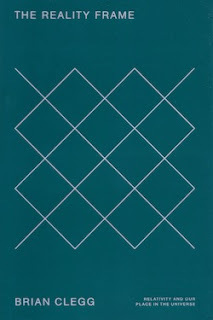 I'm delighted to say that my latest book,
The Reality Frame
is now available as a truly lovely hardback and ebook - the cover picture really doesn't do it justice.
I'm delighted to say that my latest book,
The Reality Frame
is now available as a truly lovely hardback and ebook - the cover picture really doesn't do it justice.I suppose the obvious question is 'What Reality Frame?' The book is about relativity and frames of reference - effectively the way we look at things/the position we look at them from.
It looks at how we've moved from very absolutist views to making much more use of relativity in science, and to do this, I use what I hope is a fun and novel approach of building a toy universe from scratch, adding in various properties to see what part relativity has to play.
Unlike your standard physics book, I don't stop with an inanimate universe, but go on to add life and creativity. This is partly because frames of reference are hugely important in these cases too. But also because, in the process, I wanted to help establish humanity's place in the universe.
We have a tendency to do ourselves down, pointing out how small and insignificant we are in a vast universe. But that doesn't take in the wide span of human achievement. In this I'm hoping to reflect the wonderful Ascent of Man series/book by Jacob Bronowski.
Please take a look at the book's web page to find out more.
Published on April 08, 2017 05:28



